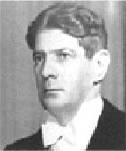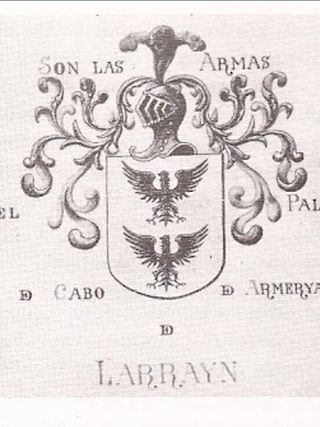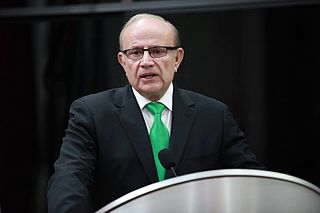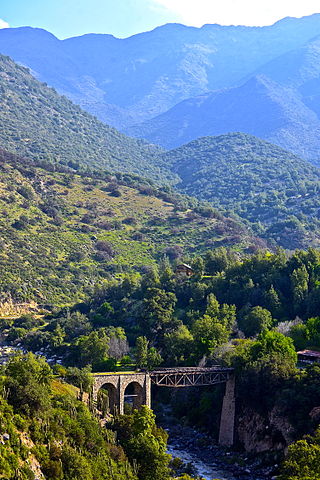Related Research Articles

Santiago, also known as Santiago de Chile, is the capital and largest city of Chile and one of the largest cities in the Americas. It is located in the country's central valley and is the center of the Santiago Metropolitan Region, which has a population of 7 million, representing 40% of Chile's total population. Most of the city is situated between 500–650 m (1,640–2,133 ft) above sea level.

Juan José de Amézaga Landaroso was a Uruguayan political figure.

San Cristóbal Hill is a hill in northern Santiago, Chile. It rises 850 m AMSL and about 300 m above the rest of Santiago; the peak is the third highest point in the city, after Cerro Manquehue and Cerro Renca. Cerro San Cristóbal was named by the Spanish conquistadors for St Christopher, in recognition of its use as a landmark. Its original indigenous name is Tupahue.
Water supply and sanitation in Colombia have been improved in many ways over the past decades. Between 1990 and 2010, access to improved sanitation increased from 67% to 82%, but access to improved water sources increased only slightly from 89% to 94%. In particular, coverage in rural areas lags behind. Furthermore, despite improvements, the quality of water and sanitation services remains inadequate. For example, only 73% of those receiving public services receive water of potable quality and in 2006 only 25% of the wastewater generated in the country underwent any kind of treatment.
Álvaro Saieh Bendeck is a Colombian academic, economist, and businessman. He is the chairman of CorpGroup, one of Chile's largest conglomerates.
The Matte family is a rich, powerful and influential Chilean family of Catalan origin. According to Forbes magazine, their wealth amounts to US$2.7 billion (2007).

Hernán Larraín Fernández is a conservative Chilean lawyer, university lecturer, and politician; he served as the Chilean Minister of Justice and Human rights, appointed by president Sebastián Piñera, between 2018 and 2022. Larraín's former public service positions include a Senate seat representing the 11th district, the Maule Region (1994-2010), the Presidency of the Senate (2004-2005) and the presidency of the Independent Democratic Union from 2006 to 2008 and 2015–2017. The UDI is a conservative political party with strong links to the Opus Dei, that opposes abortion and has historically supported Augusto Pinochet dictatorship. His appointment as Minister of Justice and Human rights has been controversial despite his attempt to distance himself from the UDI's ideology regarding human rights to achieve a more conciliatory tone as a minister.

The Larraín family is an influential Chilean family of Basque origin. Their members include prominent aristocratic politicians and businessmen. The Larrain family first arrived in Chile more than 450 years ago, and they have been part of Chile's history ever since. The Larrain family form part of a group of families commonly referred to as the 'double-RRs', surnames which include two RRs.

Magdalena Matte Lecaros is a Chilean businesswoman and politician. She is member of the Independent Democratic Union (UDI) and was part of Chile's Ministry of Housing and Urban Development under Chile's former President Sebastián Piñera for the term of 2010–2014. She is a member of the Matte family.

The El Quimbo Dam is a concrete faced rock-fill dam (CFRD) and hydroelectric power facility in the Huila Department of southwestern-central Colombia, approximately 69 kilometres (43 mi) south of the city of Neiva, on the Magdalena River. It is located about 1,300 metres (4,300 ft) upstream from the confluence of the Páez River with the Magdalena River. Its works were officially opened on February 25, 2011 in the presence of President Juan Manuel Santos. It is one of the largest infrastructure projects in the country. The project was completed 4 years later, in late 2015.

Vernon Pérez Rubio Artee is a Mexican businessman and politician. At present, he is a local deputy, elected by proportional representation by the Partido Verde Ecologista de México party, in the LX Legislature of the Congress of Sonora.

Puente Alto-El Volcán Railway is a small military railway between Puente Alto and El Volcán in Chile. The railway had a narrow gauge of 600 mm, and was constructed in 1906 under Chile's Ministry of Railways. As each section was completed, it was inaugurated: on March 1, 1910 ; in 1911 ; and on June 9, 1914. The railway was built at a cost of $2,335,630 and remained operational until 1985.

The Santiago Cable Car is an aerial tramway of a tourist nature, located at the Metropolitan Park of San Cristóbal Hill, in Santiago, Chile.
Federal Highway 305D is a toll highway in Quintana Roo. It serves as a spur of Federal Highway 180D (Mérida-Cancún) to Playa del Carmen, creating a direct connection between Yucatán and Playa del Carmen and avoiding detours through Cancún or Tulum.
The Coatzacoalcos Underwater Tunnel is a tunnel under the Coatzacoalcos River, connecting the cities of Coatzacoalcos and Villa de Allende in the Mexican state of Veracruz. The tunnel was formally opened on April 27, 2017, making it the first undersea tunnel in Mexico. after a 13-year construction process characterized by delays and increased costs and for which it has been described as a "monument to corruption". It is operated by a subsidiary of IDEAL, a company controlled by Carlos Slim.

Squatting in Chile is the occupation of unused land or derelict buildings without the permission of the owner. From the 1960s onwards, informal settlements known as callampas were permitted although there were also evictions such as the massacre of Puerto Montt in 1969. In the 1970s, the government of Salvador Allende encouraged occupations, then following the coup d'état, the military junta repressed squatting. Callampas then became known as campamentos.
Edwin José Besaile Fayad is a Colombian architect and politician, who was governor of the department of Córdoba for the Party of the U. Party. He is a member of the Besaile Fayad clan, with his brothers, former senator Musa Besaile, and the former mayor of the municipality of Sahagún Jhon Moisés Besaile.
The Convenios case is an ongoing political scandal in Chile about the discretionary contracting of politically connected non-governmental organizations (NGO) by regional government entities. The scandal began with the Democracia Viva case named after the NGO Democracia Viva but was subsumed into a larger scandal as more similar cases were uncovered. It is the first large corruption scandal to affect the ruling coalition since Gabriel Boric became president in March 2022.

Conrado Ríos Gallardo was a Chilean journalist, diplomat and politician, member of the Liberal Party (PL). He served as Minister of Foreign Affairs during the first government of President Carlos Ibáñez del Campo, from 1927 to 1929. Likewise, he served as Chile's ambassador to the Republic of Peru between 1929 and 1931 ; and as Chile's ambassador to the Argentine Republic during the presidencies of the radicals Pedro Aguirre Cerda, Juan Antonio Ríos, and the second administration of Ibáñez del Campo, the latter position between 1953 and 1956.